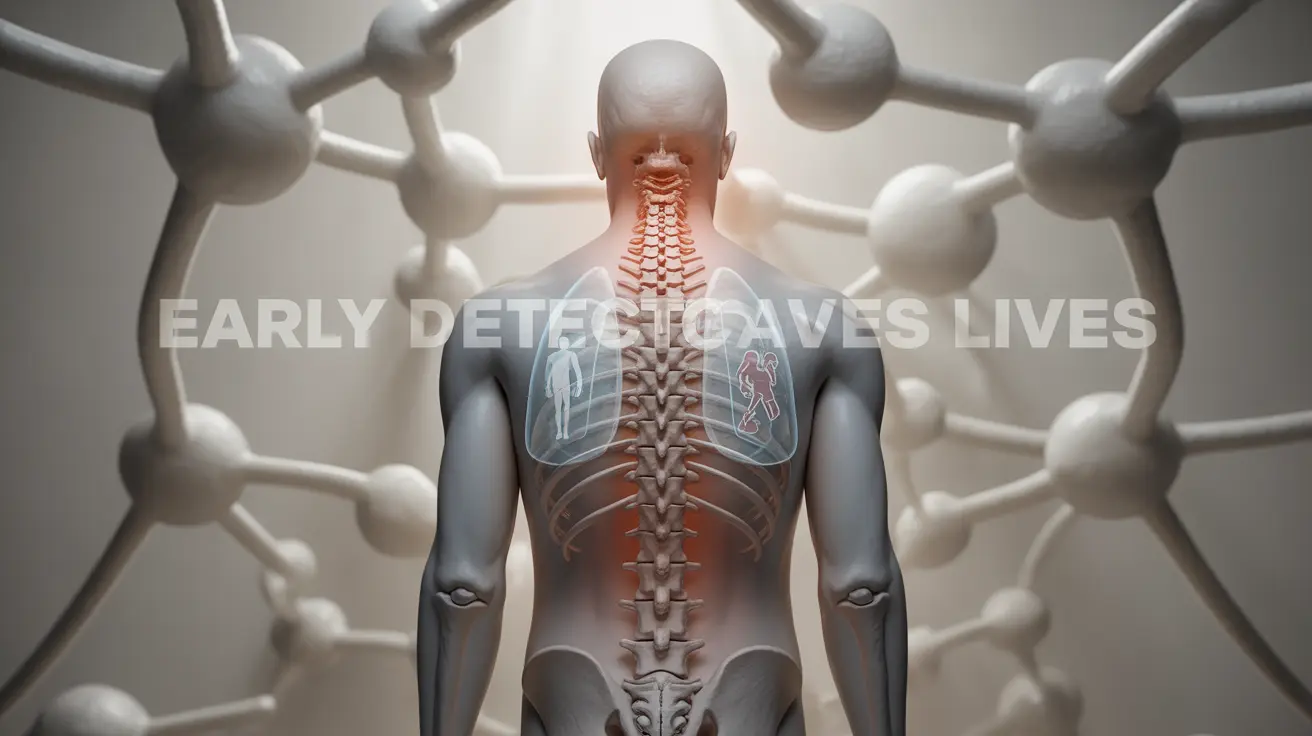Upper back pain is a common complaint that can stem from various causes, ranging from muscle strain to more serious conditions. While most cases of upper back pain are benign and related to lifestyle factors, it's important to understand when such pain might signal something more serious, including certain types of cancer.
In this comprehensive guide, we'll explore the relationship between upper back pain and cancer, including warning signs, associated symptoms, and when to seek medical attention. Understanding these factors can help you make informed decisions about your health care.
Types of Cancer Associated with Upper Back Pain
Several types of cancer can cause upper back pain as either an early warning sign or as the disease progresses:
- Lung cancer
- Multiple myeloma
- Breast cancer that has spread
- Spinal tumors
- Lymphoma
Each of these cancers can affect the upper back region differently, either through direct tumor growth or metastasis (spread) to the bones of the spine or surrounding tissues.
Distinguishing Characteristics of Cancer-Related Back Pain
Cancer-related upper back pain often presents differently from common mechanical back pain. Key characteristics include:
- Pain that persists or worsens even with rest
- Pain that tends to be worse at night
- Unexplained weight loss accompanying the pain
- Pain that doesn't improve with typical treatments
- Deep, aching pain that may feel like it's coming from within the bones
Warning Signs and Associated Symptoms
When upper back pain is caused by cancer, it rarely occurs in isolation. Watch for these accompanying symptoms:
- Unexplained fatigue
- Persistent cough or shortness of breath
- Night sweats
- Loss of appetite
- Unexplained weakness
- Numbness or tingling in arms or legs
- Fever without apparent cause
When to Seek Medical Attention
While most upper back pain isn't caused by cancer, certain situations warrant prompt medical evaluation:
- Pain lasting more than 6 weeks despite conservative treatment
- Pain accompanied by unexplained weight loss
- Pain that's severe enough to wake you from sleep
- Pain accompanied by neurological symptoms
- Pain that develops without any clear cause
Diagnostic Process
If cancer is suspected, healthcare providers typically follow a systematic approach to diagnosis:
- Thorough medical history and physical examination
- Imaging studies (X-rays, MRI, CT scans)
- Blood tests
- Possible biopsy if suspicious areas are identified
- Additional specialized tests based on specific symptoms
Frequently Asked Questions
Can upper back pain be an early sign of cancer, and which types of cancer are most commonly involved?
Yes, upper back pain can be an early sign of cancer, particularly lung cancer, multiple myeloma, and metastatic breast cancer. However, it's important to note that cancer is not a common cause of upper back pain, and most cases are due to musculoskeletal issues.
What symptoms accompanying upper back pain should make me worry about cancer?
Be particularly concerned if upper back pain is accompanied by unexplained weight loss, night sweats, persistent fatigue, fever without clear cause, or pain that worsens at night or doesn't improve with rest. These symptoms warrant prompt medical evaluation.
How can cancer cause upper back pain, and what does this pain typically feel like?
Cancer can cause upper back pain through direct tumor growth, metastasis to bones, or pressure on nerves. The pain typically feels deep, persistent, and may be worse at night. It often doesn't improve with standard pain relief measures and may feel different from mechanical back pain.
When should I see a doctor about persistent upper back pain to rule out cancer?
Seek medical attention if your upper back pain persists for more than six weeks, is severe enough to wake you at night, is accompanied by unexplained weight loss or other concerning symptoms, or doesn't respond to conservative treatment measures.
What are the differences between upper back pain caused by cancer and pain from other common conditions?
Cancer-related back pain typically doesn't improve with rest or over-the-counter pain medications, tends to be progressive, and is often accompanied by other systemic symptoms. Common mechanical back pain usually relates to activity, improves with rest, and doesn't typically cause systemic symptoms.




